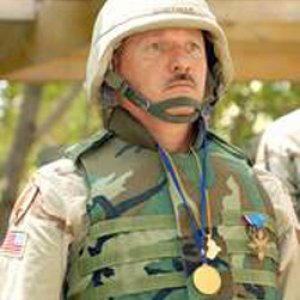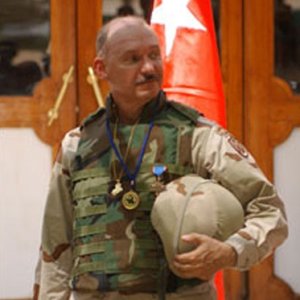- SURNAME
Coffman
- FORENAME
James H.,Jr
- UNIT
USASOC (Senior Advisor to Iraqi 3rd Special Police Commando Brigade)
- RANK
Colonel
- NUMBER
- AWARD
Distinguished Service Cross
- PLACE
Iraq 2004
- ADDITIONAL INFORMATION
from Barrington,Massachusetts
age 51
entered service 1972 Great Barrington,Massachusetts
graduated USMA,West Point 1978
graduated Naval Postgraduate School,Monterey,California
Company B,3 Bn 28th Infantry Regiment
qualified Ranger and Special Forces
Office of the Assistant Secretary of Defense for Special Ops and Low Intensity Conflict (Pentagon) 2003
Iraq December 2003
WIA 11.11.2004 Mosul,Iraq
returned to Pentagon (same duties)
CITATION:
Distinguished Service Cross : The President of the United States of America, authorized by Act of Congress, July 9, 1918 (amended by act of July 25, 1963), takes pleasure in presenting the Distinguished Service Cross to Colonel (Infantry) James Henry Coffman, Jr., United States Army, for exceptionally valorous conduct against anti-Iraq forces while assigned as Senior Advisor, 3d Special Police Commando Battalion, Multi-National Security Transition Command-Iraq, at Mosul, Iraq, on 14 November 2004, during Operation IRAQI FREEDOM II. Colonel Coffman was part of a quick-reaction force sent to reinforce the Four West Police Station in Mosul. During the ensuing battle, despite repeatedly being uncovered to enemy fire and despite a serious injury to his left hand, he took command of the Police Commando element and led them in engaging the enemy for over four and a half hours until reinforcements arrived on the scene. Colonel Coffman's heroic actions under fire are in keeping with the finest traditions of military service and reflect credit upon himself, the Multi-National Security Transition Command-Iraq, and the United States Army.
NARRATIVE TO ACCOMPANY AWARD
Colonel Coffman distinguished himself by exceptionally valorous conduct while assigned as the Senior Advisor to the 1st Iraqi Special Police Commando Brigade during a lengthy battle on 14 November 2004 in Mosul, Iraq, during which the unit likely would have been overrun were it not for the courageous leadership of Colonel Coffman and the one Commando officer not wounded. At approximately 1030 hours on 14 November, Colonel Coffman moved with a Commando Quick Reaction Force (QRF) to reinforce a Commando platoon under attack at the Four West Police Station in Mosul. As the QRF neared the besieged platoon, it came under intense rocket-propelled grenade, mortar, machinegun, and AK-47 fire by a large insurgent force. Over the next four hours, the enemy repeatedly assaulted the Commandos' position, at times culminating their attacks twenty meters from Colonel Coffman's location. With all but one of the commando officers killed or seriously wounded by the initial enemy fire, Colonel Coffman exhibited truly inspirational leadership, rallying the Commandos and organizing a hasty defense while attempting to radio higher headquarters for reinforcements. Under heavy fire, he moved from Commando to Commando, looking each in the eye and using hand and arm signals to demonstrate what he wanted A Times. At one point, an enemy round shattered Colonel Coffman's shooting hand and rendered his M4 rifle inoperable. After bandaging his hand, Colonel Coffman picked up AK-47s from Commando casualties and fired them with his other hand until each ran out of ammunition. With the assistance of the one remaining Commando officer, Colonel Coffman redistributed ammunition among the uninjured commandos until he had only loose ammunition that he loaded by placing magazines between his legs and using his one working hand. Throughout this period, he repeatedly demonstrated exceptional courage and an extraordinary example to the commandos as they repulsed attack after attack by the enemy. Four hours after the start of the battle, a second Commando element arrived and Colonel Coffman guided them to his position. Even after their arrival, he continued to direct the fight, refusing to be evacuated until the enemy was defeated. Shortly thereafter, attack helicopters also arrived, followed closely by a Stryker Brigade QRF, and Colonel Coffman used Iraqi radios to direct air strikes and to provide vital information on the location of enemy and friendly forces. After supervising the evacuation of several dozen wounded Commandos, Colonel Coffman led a squad-sized element to the Four West Iraqi Police Station, fifty meters ahead of the Strykers, to make contact with the Commandos still in the station. After they linked up, the Strykers moved forward, and attack helicopters engaged the buildings occupied by the enemy, following which Colonel Coffman returned to his original position to ensure that all of the Iraqi casualties had been evacuated. Only then did he consent to be evacuated for surgery for his own serious wound. During the fierce four-hour battle, twelve Commandos were killed and 42 were wounded. Twenty-five enemy were killed and many dozens more were wounded. The personal courage and heroic actions displayed throughout the fight by Colonel Coffman in the face of heavy enemy fire and repeated attacks were absolutely critical to defeating the enemy force and to saving Iraqi lives. Colonel Coffman's gallantry in action was in keeping with the finest traditions of the American military and reflects great credit on him, the Multinational Force-Iraq, the U.S. Special Operations Command, and the United States of America.
NARRATIVE TO ACCOMPANY AWARD
Colonel Coffman distinguished himself by exceptionally valorous conduct while assigned as the Senior Advisor to the 1st Iraqi Special Police Commando Brigade during a lengthy battle on 14 November 2004 in Mosul, Iraq, during which the unit likely would have been overrun were it not for the courageous leadership of Colonel Coffman and the one Commando officer not wounded. At approximately 1030 hours on 14 November, Colonel Coffman moved with a Commando Quick Reaction Force (QRF) to reinforce a Commando platoon under attack at the Four West Police Station in Mosul. As the QRF neared the besieged platoon, it came under intense rocket-propelled grenade, mortar, machinegun, and AK-47 fire by a large insurgent force. Over the next four hours, the enemy repeatedly assaulted the Commandos' position, at times culminating their attacks twenty meters from Colonel Coffman's location. With all but one of the commando officers killed or seriously wounded by the initial enemy fire, Colonel Coffman exhibited truly inspirational leadership, rallying the Commandos and organizing a hasty defense while attempting to radio higher headquarters for reinforcements. Under heavy fire, he moved from Commando to Commando, looking each in the eye and using hand and arm signals to demonstrate what he wanted A Times. At one point, an enemy round shattered Colonel Coffman's shooting hand and rendered his M4 rifle inoperable. After bandaging his hand, Colonel Coffman picked up AK-47s from Commando casualties and fired them with his other hand until each ran out of ammunition. With the assistance of the one remaining Commando officer, Colonel Coffman redistributed ammunition among the uninjured commandos until he had only loose ammunition that he loaded by placing magazines between his legs and using his one working hand. Throughout this period, he repeatedly demonstrated exceptional courage and an extraordinary example to the commandos as they repulsed attack after attack by the enemy. Four hours after the start of the battle, a second Commando element arrived and Colonel Coffman guided them to his position. Even after their arrival, he continued to direct the fight, refusing to be evacuated until the enemy was defeated. Shortly thereafter, attack helicopters also arrived, followed closely by a Stryker Brigade QRF, and Colonel Coffman used Iraqi radios to direct air strikes and to provide vital information on the location of enemy and friendly forces. After supervising the evacuation of several dozen wounded Commandos, Colonel Coffman led a squad-sized element to the Four West Iraqi Police Station, fifty meters ahead of the Strykers, to make contact with the Commandos still in the station. After they linked up, the Strykers moved forward, and attack helicopters engaged the buildings occupied by the enemy, following which Colonel Coffman returned to his original position to ensure that all of the Iraqi casualties had been evacuated. Only then did he consent to be evacuated for surgery for his own serious wound. During the fierce four-hour battle, twelve Commandos were killed and 42 were wounded. Twenty-five enemy were killed and many dozens more were wounded. The personal courage and heroic actions displayed throughout the fight by Colonel Coffman in the face of heavy enemy fire and repeated attacks were absolutely critical to defeating the enemy force and to saving Iraqi lives. Colonel Coffman's gallantry in action was in keeping with the finest traditions of the American military and reflects great credit on him, the Multinational Force-Iraq, the U.S. Special Operations Command, and the United States of America.
WEB LINKS:
https://valor.militarytimes.com/hero/3674
Last edited by a moderator:





